|
Printables |
PowerPoints |
Online exercises |
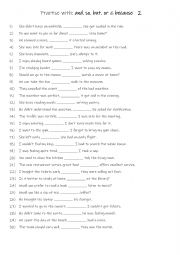
|
A1+- A2 Practise with and, so, but, or & because 2
First, students need to familiarise themselves with the 5 linkers and their usage. Then they read the sentences to see which one is needed to complete the gap-fill. Each conjunction is used 6 times! Answers on page 2.
Level: elementary
Age: 8-100
Type:
Downloads: 116
|
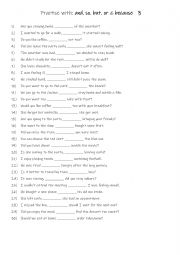
|
A1+- A2 Practise with and, so, but, or & because 3
First, students need to familiarise themselves with the 5 linkers and their usage. Then they read the sentences to see which one is needed to complete the gap-fill. Each conjunction is used 6 times! Answers on page 2.
Level: elementary
Age: 8-100
Type:
Downloads: 111
|
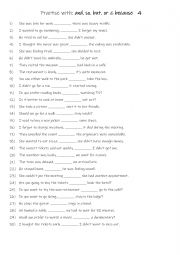
|
A1+- A2 Practise with and, so, but, or & because 4
First, students need to familiarise themselves with the 5 linkers and their usage. Then they read the sentences to see which one is needed to complete the gap-fill. Each conjunction is used 6 times! Answers on page 2.
Level: elementary
Age: 9-100
Type:
Downloads: 107
|
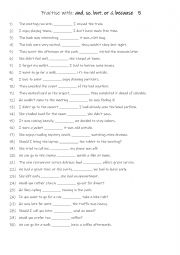
|
A1+- A2 Practise with and, so, but, or & because 5
First, students need to familiarise themselves with the 5 linkers and their usage. Then they read the sentences to see which one is needed to complete the gap-fill. Each conjunction is used 6 times! Answers on page 2.
Level: elementary
Age: 8-100
Type:
Downloads: 113
|
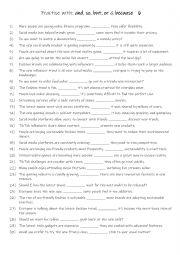
|
A1+- A2 Practise with and, so, but, or & because 6
First, students need to familiarise themselves with the 5 linkers and their usage. Then they read the sentences to see which one is needed to complete the gap-fill. Each conjunction is used 6 times! Answers on page 2.
Level: elementary
Age: 8-100
Type:
Downloads: 131
|
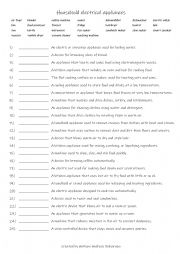
|
A1+-A2 25 Household electrical appliances
First, students need to familiarise themselves with the 25 words and their meanings Then they read the definitions to see which one is being described and write that word in the space provided. Answers on page 2.
Level: elementary
Age: 8-100
Type:
Downloads: 110
|
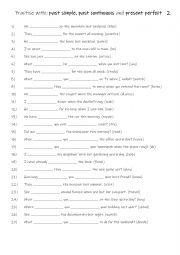
|
A1+-A2 Practise with past simple, past continuous and present perfect 2
First, students need to familiarise themselves with the 3 tenses and their use. Then they read the sentences to work out which one is needed to complete the gap-fill using the given verb in (). Each tense is used 9 times! Answers on page 2
Level: elementary
Age: 8-100
Type:
Downloads: 114
|
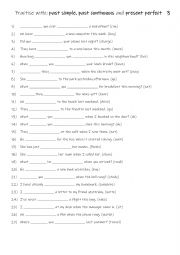
|
A1+-A2 Practise with past simple, past continuous and present perfect 3
First, students need to familiarise themselves with the 3 tenses and their use. Then they read the sentences to work out which one is needed to complete the gap-fill using the given verb in (). Each tense is used 9 times! Answers on page 2
Level: elementary
Age: 8-100
Type:
Downloads: 103
|
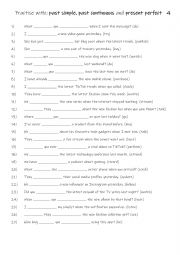
|
A1+-A2 Practise with past simple, past continuous and present perfect 4
First, students need to familiarise themselves with the 3 tenses and their use. Then they read the sentences to work out which one is needed to complete the gap-fill using the given verb in (). Each tense is used 9 times! Answers on page 2
Level: elementary
Age: 8-100
Type:
Downloads: 107
|
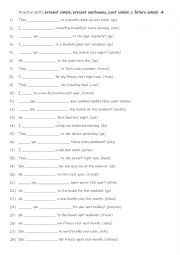
|
A1+-A2 Practise with present simple, present continuous, past simple & future simple 4
Students should learn and practice the present simple, present continuous, future simple, and past simple tenses at the A1+-A2 level because these tenses are essential for everyday communication, such as discussing routines, ongoing activities, past events, and simple future plans. They provide a solid foundation for learning more advanced grammar ...
Level: elementary
Age: 8-100
Type:
Downloads: 131
|
|
|
|
|












